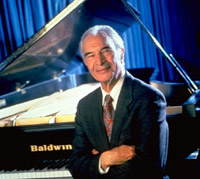
Jazz pianist and composer Dave Brubeck has been awarded the University of Notre Dame’s Laetare Medal for 2006. He will receive the medal, the oldest and most prestigious honor given to American Catholics, during the University’s 161st Commencement exercises May 21 (Sunday).
“The composed energy of Mr. Brubeck’s art helps us apprehend the fullness of creation,” said Notre Dames president, Rev. John I. Jenkins, C.S.C. “His life and his music splendidly interweave the celebration of beauty with the imperative to worship.”
Born Dec. 6, 1920, in Concord, Calif., Brubeck spent much of his childhood on a cattle ranch near Ione, aspiring to be a rancher. His mother was a classical pianist and teacher, and by the time her son was 4 years old, he had delighted her with his precocious keyboard skill while troubling her with his predilection for popular tunes and idiosyncratic improvisations. He attended the College of the Pacific in Stockton,Calif., at first intending to study veterinary medicine, but becoming a music major within a year of his arrival. While in college, he played jazz for a weekly campus radio show whose director was Iola Marie Whitlock, a woman to whom he has now been married for 63 years. He was graduated in 1942.
Drafted for military service following college, he spent two years of World War II playing in a band at Camp Haan in Southern California before being sent to the European theatre in 1944. He once said that his experience of war convinced him that something should be done musically to strengthen man’s knowledge of God. After the war, he returned to California and enrolled at Mills College under the GI Bill to study music with the French classical composer Darius Millhaud.
He began playing jazz in San Francisco nightclubs, and by 1951 had formed the Brubeck Quartet, which so dramatically reshaped both the sounds and the audiences of American jazz music that the 1954 release of its album, Jazz Goes to College, was the subject of a Time magazine cover story which described Brubeck as the most exciting new jazz artist at work today and the composer and performer of some of the strangest and loveliest music ever played since jazz was born.
In addition to such signature works as Blue Rondo a la Turk and Take Five, Brubeck has written, performed, and recorded ballets, a musical, an oratorio, cantatas, a Mass, compositions for jazz combos and orchestras, and numerous solo piano pieces.
Last June, on a National Public Radio program, Brubeck spoke of his belief that we each are protagonists in a great human drama and it is in our daily choices, large and small, that we contribute on one side or the other in a continual struggle between good and evil, forgiveness and revenge, mercy and ruthless power. He said that he thought that all great faiths had in common the imperativeto love your enemies, and quoted Chief Joseph of the Nez Perce tribe’s observation that the Great Spirit made us all.
“Science through DNA knows this to be true,” Brubeck said. “The very cells of our body know this to be true, and our great religions know it to be true. Our hope lies in the Great Spirit, the God of all Creation, that my particular faith calls the Holy Spirit.”
The Laetare (pronounced Lay-tah-ray) Medal is so named because its recipient is announced each year in celebration of Laetare Sunday, the fourth Sunday in Lent on the Church calendar. “Laetare,” the Latin word for “rejoice,” is the first word in the entrance antiphon of the Mass that Sunday, which ritually anticipates the celebration of Easter. The medal bears the Latin inscription, “Magna est veritas et prevalebit”“Truth is mighty, and it shall prevail.”
Established at Notre Dame in 1883, the Laetare Medal was conceived as an American counterpart of the Golden Rose, a papal honor which antedates the 11th century. The medal has been awarded annually at Notre Dame to a Catholic “whose genius has ennobled the arts and sciences, illustrated the ideals of the Church and enriched the heritage of humanity.”
Among the 128 previous recipients of the Laetare Medal are Civil War Gen. William Rosecrans, operatic tenor John McCormack, President John F. Kennedy, Catholic Worker foundress Dorothy Day, novelist Walker Percy, Cardinal Joseph Bernardin, and death penalty abolitionist Sister Helen Prejean.
TopicID: 16524